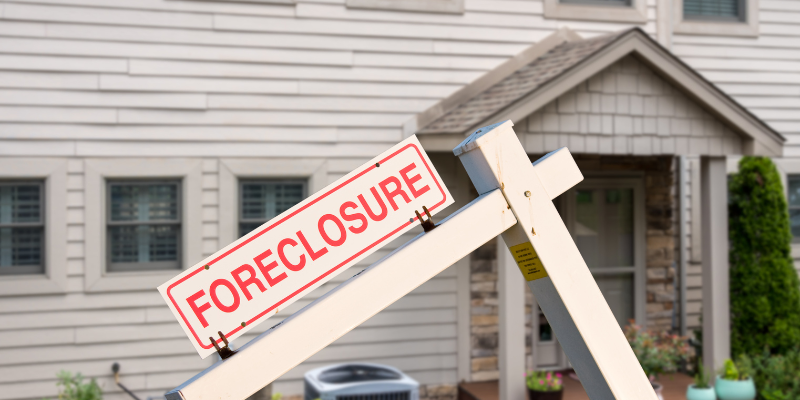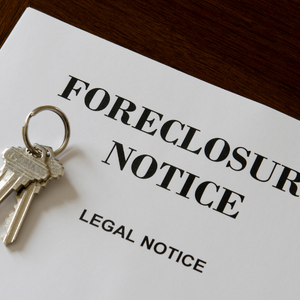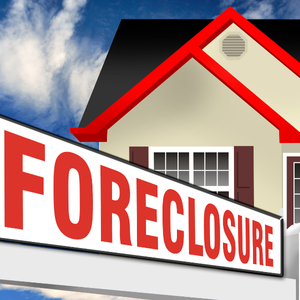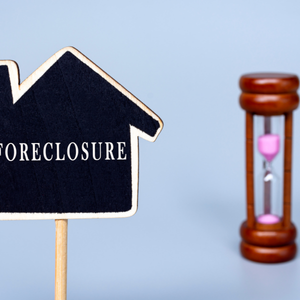
Worried the bank might suddenly foreclose on your home? The truth is, foreclosure in Washington takes time, often several months, and the system includes protections and support for homeowners along the way. By acting early and exploring options like a successful home sale, you can avoid foreclosure and take control of the outcome.
What is Foreclosure?
The word foreclosure often strikes fear into homeowners’ hearts – even if they’ve never experienced it themselves or fully understand what it means.
Foreclosure is the legal process in which a lender takes possession of a home and forces its sale, usually through an auction, due to a homeowner defaulting on their loan, typically by missing multiple mortgage payments.
Most homeowners rely on loans from banks in order to afford their house. To protect their investment, banks reserve the right to foreclose if the borrower fails to meet the terms of the loan. Through foreclosure, the lender reclaims the property and sells it in an attempt to recover the outstanding debt. This means that until your mortgage is fully paid off, your home can still be subject to foreclosure.
But don’t stress about it just yet; missing one mortgage payment won’t immediately trigger the foreclosure process. In fact, in Washington, D.C., lenders are legally required to wait 120 days before officially starting the process. During that time, you’ll receive notices about your missed payments and the total amount owed, giving you a chance to catch up or explore your options.
What Happens During the Foreclosure Process?
The foreclosure process generally has two stages: pre-foreclosure and foreclosure. It’s important to understand which stage you’re in, as this will affect your available options and how you move forward.

The pre-foreclosure process unofficially starts when you miss your first mortgage payment and continues once you receive a foreclosure notice. Normally, this takes three months, or four missed mortgage payments. During this period, the bank will reach out to inform you that you’ve breached your loan agreement. If 30 days pass without payment, the bank will send a notice of default, followed by a demand letter outlining the total amount owed, including the missed mortgage payment and any additional fees incurred due to the delinquency. The bank is also legally required to inform you of your options for resolving the situation.
If no agreement is reached with your lender, the process moves to the foreclosure stage. This officially begins when the bank issues a notice of trustee’s sale or a summons and complaint. Keep in mind that even at this point, you still have the opportunity to catch up on missed payments and halt the foreclosure process.
The home is then scheduled for sale at a public auction, where bidding typically starts at the amount owed on the loan. The highest bidder wins the property, but if no bids are received, the lender retains ownership, and the property becomes “real estate owned (REO).” At this stage, you will be evicted from the home. It’s important to note that Washington, DC does not have a redemption period, unlike some other states, meaning once the sale is complete, you cannot reclaim the property.
Two Types Of Foreclosure In Washington: Judicial vs. Non-Judicial
Washington D.C. allows lenders to pursue foreclosure through two different methods: judicial and non-judicial foreclosure. The key difference is whether the process goes through the court system. While non-judicial foreclosure remains more common, judicial foreclosure may still be used in certain cases, typically when the loan is secured by a mortgage rather than a deed of trust.
Judicial Foreclosure
If a home loan is secured by a mortgage (rather than a deed of trust ), the lender can initiate foreclosure by filing a lawsuit in court. This begins with the lender submitting evidence that the borrower has defaulted on their loan. Homeowners will be served with a summons and complaint, giving them an opportunity to respond, contest the action, or negotiate a settlement.
If the homeowner fails to respond within the required timeframe, the court may issue a default judgment in favour of the lender, allowing the foreclosure to proceed.
Judicial foreclosure typically takes longer and can offer homeowners more time and legal avenues to resolve the issue.
Non-Judicial Foreclosure
Non-judicial foreclosure is more commonly used in Washington, DC, particularly for loans secured by a deed of trust. This process does not involve the court system and is instead carried out by a third party known as a trustee.
Due to the Foreclosure Fairness Act (FFA), before non-judicial foreclosure can proceed, lenders must notify eligible homeowners of the mediation program. This program provides access to foreclosure counseling and neutral third-party mediators to help explore alternatives to foreclosure.
To participate, homeowners must be referred to the mediation program by a HUD-approved housing counselor or attorney. The lender must send a notice of default that includes the total amount owed and information about the mediation program.
If mediation doesn’t result in a resolution, the lender may issue a notice of trustee’s sale, and by law, at least 30 days must pass from the date of this notice before the home can be sold at an auction. At this stage, Panda Pro Home Buyers can step in to help you explore fast-sale options and avoid foreclosure.
What Happens If Your House Gets Foreclosed?
If you’re unable to catch up on your mortgage payments, foreclosure can have lasting consequences.
Aside from being forcibly evicted and losing your home, you may also lose any equity you’ve built, especially if you weren’t able to sell the property on your own terms before the foreclosure sale. That means losing years of hard work and missing out on any potential profit from the appreciation of your home’s value.
A foreclosure will also stay on your credit history for up to seven years, which can significantly impact your ability to get approved for loans or buy another home in the future.
What Are My Options If I’m Facing Foreclosure?
Even if you’re facing foreclosure, there are still ways to get out of this pickle. Washington D.C. has laws designed to protect homeowners, and in many cases, lenders prefer to find a solution rather than go through the costly foreclosure process.
If you’re facing foreclosure, here are some options you can consider:
Pay All Missed Mortgage Payments
Even after receiving a foreclosure notice, you can still reinstate your loan by paying off all missed payments, late fees, and other costs, as long as the home hasn’t been sold at auction. This option allows you to keep your home and stop the foreclosure process in its tracks.
Ask for a Loan Modification.
If you’re experiencing a temporary hardship (like job loss or medical issues), you can request a loan modification. This might include extending your loan term or reducing monthly payments to make them more manageable.
Do note that lenders are not obligated to approve your request, but many are willing to work with borrowers to avoid foreclosure.
Foreclosure Mediation
Washington, D.C., offers a foreclosure mediation program for eligible homeowners. This involves a neutral third party who helps you and your lender explore alternatives to foreclosure.
This is especially useful if you’re struggling to communicate with your lender or want support negotiating.
Eligibility for this program requires a referral from a housing counselor or attorney, and it must be initiated early in the process.
Deed in Lieu of Foreclosure
You may choose to voluntarily transfer the property back to your lender instead of going through foreclosure. This option can help you avoid the negative stigma and deeper credit damage that comes with a formal foreclosure.
This option is only available if the home hasn’t already gone to auction and there are no other liens on the property.
Do a Short Sale
If your home is worth less than what you owe, you can request a short sale, where the lender agrees to let you sell the property for less than the loan balance.
While this will still impact your credit, it’s generally less damaging than a foreclosure and gives you more control over the process.
Sell Your House
You can also sell the house on your own before the bank takes it to auction. This is one of the most straightforward ways to avoid foreclosure, especially during pre-foreclosure, and may still allow you to walk away with the equity or minimal losses.
File for bankruptcy
As a last resort, filing for bankruptcy, such as Chapter 13, can temporarily stop the foreclosure through an automatic stay. This gives you time to reorganize your finances or set up a replacement plan. While bankruptcy has serious long-term effects on your credit, it may be the right option if you’re facing large debts in addition to your mortgage
How To Sell A House In Pre-Foreclosure
Selling a home that’s facing foreclosure isn’t drastically different from a regular home sale. However, the key difference lies in the tighter timeline and the financial pressure that often comes with the threat of foreclosure.
Set Your Sale Price

This is a crucial step that will determine whether you’ll be able to successfully sell your home on time and walk away without owing anything. There are several factors to consider:
- What is your home worth in the current market?
- How much do you owe on your mortgage (including late fees)?
- When do you need to close the sale?
- Are there any other selling costs?
You must take into consideration that your home’s value should correspond to its current condition.
For example, selling it as-is without making repairs or even clearing personal belongings will likely lower the sale price. On the other hand, since you’re still in pre-foreclosure, you may have time to make improvements that can increase your home’s value to cover the mortgage fees and closing costs.
Once you have evaluated these factors, you’ll have a clear idea of the minimum price you need to sell for in order to break even or make a profit. This is especially helpful if you’re looking to sell your home for cash in Washington, D.C., or nearby cities, where quick transactions often depend on clear pricing goals.
Decide on the Best Method of Sale
Now that you have your price in mind, consider the best way to sell: listing with a real estate professional or selling directly to a cash buyer.
To make this choice, ask yourself:
- How quickly do I need to sell?
- How much work am I willing to put in?
- Can I afford extra costs like commission or repairs?
A real estate professional typically charges around 6% of the sale price, but they’ll handle most of the process, from marketing to negotiating. This can help attract more prospective buyers, especially if your home is in good condition.
If you’re short on time or want to avoid extra fees, cash buyers may be the better route. They usually don’t charge commission, buy properties as-is, and can often close in as little as 7-10 days.
Contact your Lender
Once you’ve secured a buyer, whether through an agent or a cash buyer, inform your lender immediately. Keeping the lines of communication open with your lender is critical, especially during pre-foreclosure.
Letting them know you’re under contract to sell can pause or even stop the foreclosure process. This can be a key advantage if you’re looking to sell your home for cash in Columbia or nearby cities, allowing for a faster resolution and potential foreclosure avoidance.
Close the Sale
After final negotiations and lender approval, it’s time to close. Make sure you account for closing costs such as title fees, escrow charges, and transfer taxes. If you’re working with cash buyers, they often cover the closing costs; just confirm before finalizing
Interested Buyers For A Foreclosure Home
It may be slightly more challenging, but just because your home is facing foreclosure doesn’t mean it won’t sell. In fact, many buyers actively look for homes in foreclosure due to their perceived affordability. This is especially true if the property is being sold as-is. In today’s high-priced housing market, buying foreclosure homes can be a great entry point for first-time buyers or investors looking for a fixer-upper, and there is also capital gains tax after selling a house.
Regular Buyers
Even if you’re at risk of foreclosure, you can still always sell your home the traditional way by listing it on the market. If you act during the pre-foreclosure period, you may have enough time to clean, make minor repairs, and market the home to the right buyer. This route often gives you the highest sale price, as it functions like a normal real estate transaction.
Just make sure you don’t advertise that your home is in foreclosure. Some buyers might see that as a chance to make lowball offers. As long as you manage the timeline well and present your home attractively, you can still come out ahead.
One thing to keep in mind, though: traditional sales come with agent commission fees, typically around 6% of the sale price. These costs can eat into your final profit, especially if your equity is already limited, so be mindful of the additional expenses involved.
Real Estate Investors
Real estate investors are always looking for the best deals, and homes facing foreclosure are often on their radar. Investors buy with the goal of earning a return, whether through reselling the property after renovations, renting it out, or simply holding onto it if the location shows potential for long-term value.
However, this option shares the disadvantage above, as selling to investors is normally done in the traditional way.
Cash Buyers
If you’re short on time, cash buyers might be your best bet. Homes in foreclosure can benefit from this option because cash buyers are known for closing quickly, sometimes in as little as 7-10 days.
Most cash buyers are also investors, but they offer a distinct advantage: they typically handle the entire selling process, including inspections, paperwork, and closing logistics. This can be a huge relief for homeowners already stressed by the daunting process.
Cash buyers can also be a good fit if your home needs a lot of work, since most are willing to purchase properties as-is, without requiring repairs or upgrades.
Tips To Avoid Foreclosure On Your Home
Consider All Your Options

Having the possibility of your home being taken away from you may cloud your judgment, but remember: you have options. Take time to understand what’s available and what fits your situation; whether that’s a loan modification, filing bankruptcy, or selling your home. If selling is the best course of action, explore methods that will get you the most return while at the same time fit your timeline.
Act Fast and Don’t Wait Until The Last Minute
Each day you wait limits your options.
For example, if you ignore notices, you could miss your chance to use the state’s mediation program. If you decide to sell, a tight timeline might make a cash sale your only option. Remember that in Washington, DC, there is no redemption period. Once your home has been auctioned off, you can’t get it back.
Final Thoughts: Selling a House in Foreclosure in Washington, D.C.
The prospect of losing your home is terrifying. However, remember that banks don’t actually want to foreclose on your home. Foreclosure is often more costly and time-consuming for banks than working with homeowners to find a solution. So don’t view your lender as the enemy. Instead, think of them as a resource; someone who understands the process and is willing to work with you to help you avoid losing your home.
The action you can take depends on which stage of foreclosure you’re at, and what your goals are, aside from staving off homelessness. If you’re looking to avoid a foreclosure on your record but need a fast solution, then selling to cash buyers might be your best bet.
So, if you’re looking for a trusted local cash buyer, look no further! We’re Panda Pro Home Buyers, and we’ve helped many Washington, D.C., and Baltimore, MD, homeowners avoid foreclosure with fair, straightforward deals. We’re a professional home-buying company that only provides honest, competitive, all-cash offers, with no pressure and no hidden fees.
Need to sell your house fast? No problem, we can close in as little as 7 days! Contact us at (410) 775-8558 or fill out the short form below – we’ll get back to you within 24 hours.
Get your no-obligation, fair cash offer sent straight to your email today!
Helpful Washington DC Blogs

| WASHINGTON DC | WASHINGTON D.C. | WASHINGTON D.C | SEATTLE, WA | EMPLOYERS | |
| ECONOMIC GROWTH | U.S. | TACOMA | REALTOR | RETURN ON INVESTMENT | ROI |
| MEDIAN HOME PRICE | PROFITS | MONEY | EQUITY | CASH | BLOG |
| AVERAGE | SELL YOUR HOUSE | A SELLERS MARKET | TO SELL YOUR HOUSE |
